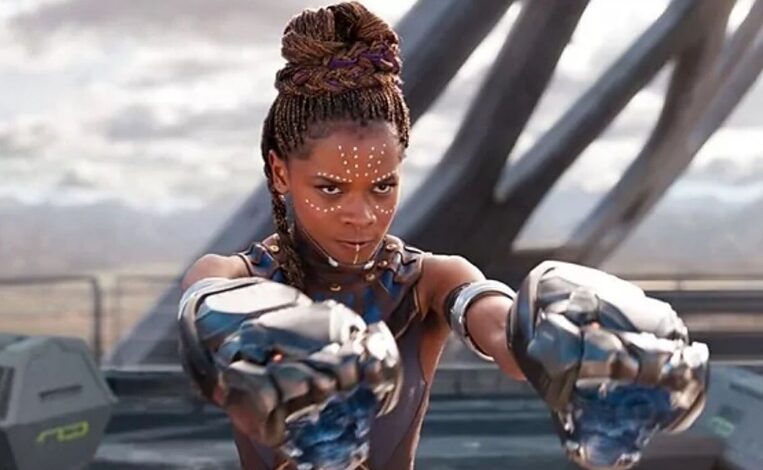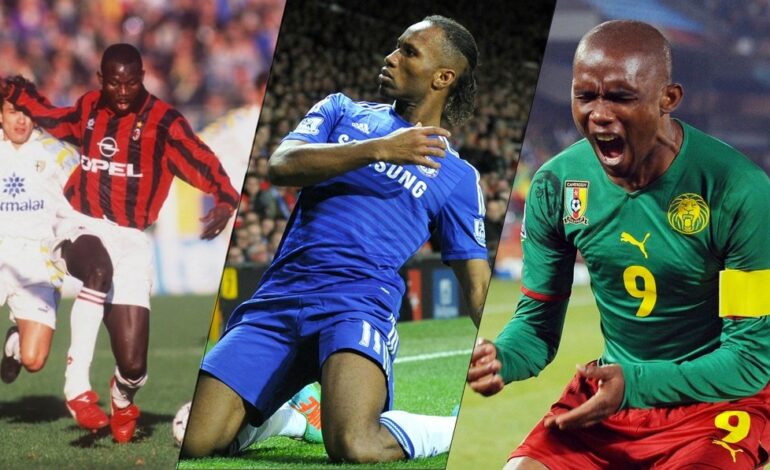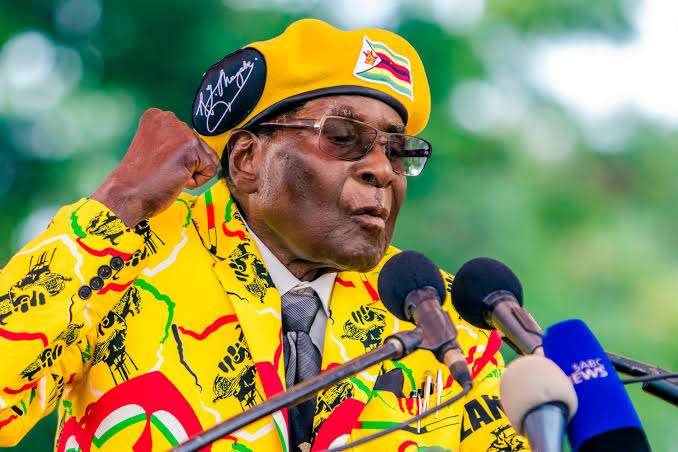
Ekeomah Atuonwu
Robert Mugabe, the world’s oldest head of state before his resignation in 2017, was the only leader Zimbabweans had known since independence in 1980.
Early Life
Robert Gabriel Mugabe, was born on February 21, 1924 in Kutama, Southern Rhodesia which is now Zimbabwe. He was the first prime minister (1980–87) of the reconstituted state of Zimbabwe, formerly Rhodesia.
Mugabe’s father was a carpenter. He went to work at a Jesuit mission in South Africa when Mugabe was just a boy, and mysteriously never came home. Mugabe’s mother, a teacher, was left to bring up Mugabe and his three siblings on her own. As a child, Mugabe helped out by tending the family’s cows and making money through odd jobs.
Although many people in Southern Rhodesia went only as far as grammar school, Mugabe was fortunate enough to receive a good education. He attended school at the local Jesuit mission under the supervision of school director Father O’Hea. A powerful influence on the boy, O’Hea taught Mugabe that all people should be treated equally and educated to the fulfillment of their abilities. Mugabe’s teachers, who called him “a clever lad,” were early to recognize his abilities as considerable.
The values that O’Hea imparted on his students resonated with Mugabe, prompting him to pass them on by becoming a teacher himself. Over the course of nine years, he studied privately while teaching at a number of mission schools in Southern Rhodesia. Mugabe continued his education at the University of Fort Hare in South Africa, graduating with a Bachelor of Arts degree in history and English in 1951. Mugabe then returned to his hometown to teach there. By 1953, he had earned his Bachelor of Education degree through correspondence courses.
Political History
Mugabe joined the National Democratic Party, an anti-colonial political group that was banned in 1963 when it became the Zimbabwe African People’s Union (ZAPU) under Joshua Nkomo and demanded an end to colonial rule. Mugabe then joined the rival Zimbabwe African National Union (ZANU) led by Rev. Ndabaningi Sithole which also called for independence and was subsequently banned.
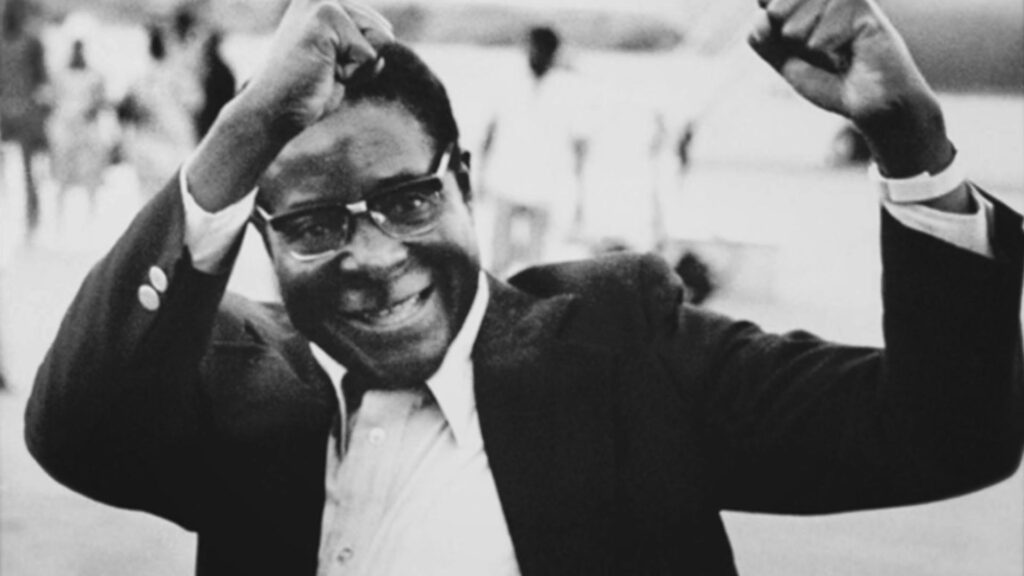
In 1964, Mugabe was arrested for subversive speech and spent the next 11 years in a Salisbury prison. In 1972, while still in prison, Mugabe was elected to lead ZANU. He emerged from prison in 1975 as the most powerful independence leader in Rhodesia.
When Ian Smith, the Prime Minister of Rhodesia, made no power-sharing concessions to the black majority, Mugabe and other leaders began a guerrilla war against the Smith regime.
Mugabe becomes Prime Minister
When Mugabe was elected prime minister in 1980, in his famous inaugural address, he urged Zimbabweans “to forget our grim past, forgive and forget.” He gained greater popularity as his government embarked on huge social spending programs, which included the creation of an excellent education system.
He announced a policy of reconciliation and invited whites to help rebuild the country. “If yesterday I fought you as an enemy, today you have become a friend,” he told them. “If yesterday you hated me, today you cannot avoid the love that binds me to you.”
In 1989, he set out to implement a five-year plan, which removed government controls on prices for farm products. In the January 1992, Mugabe became a widower following Sally’s death due to kidney failure. In August 1996, he officially married and wed Grace Marufu, who is suspected to have been his mistress even when Sally was alive. His two children, Bona and Robert Junior were born in 1988 and 1990 respectively, well before the publicised wedding. His last born is Chatunga Bellarmine.
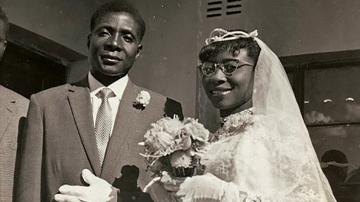
Although the first decade of Mugabe’s rule led to better nutrition and less poverty among the African majority, by the early 1990s, as his economic policies hurt the general population and increased the potential for political opposition, he increasingly turned to repressive measures to control the nation.
In 1998 and 2000, riots over food shortages and high prices on government-controlled commodities broke out in major Zimbabwean cities.
The economy shrank by more than a third from 2000 to 2008, sending unemployment above 80 percent. Several million Zimbabweans fled, mostly to South Africa.
Brushing aside criticism, Mugabe portrayed himself as a radical African nationalist competing against racist and imperialist forces in Washington and London.
President from 1987 to 2017
Mugabe and his party continued to win elections, but the victories were largely contested. On March 29, 2008, when he lost the presidential election to Morgan Tsvangirai, leader of the opposing Movement for Democratic Change, Mugabe was unwilling to let go off the reins. This became a historic moment as it marked Mugabe’s first ever clear and officially acknowledged defeat. However, the official results that came out after about five weeks of waiting gave way for a runoff election, the first of its kind in Zimbabwe, on the 27th of June.
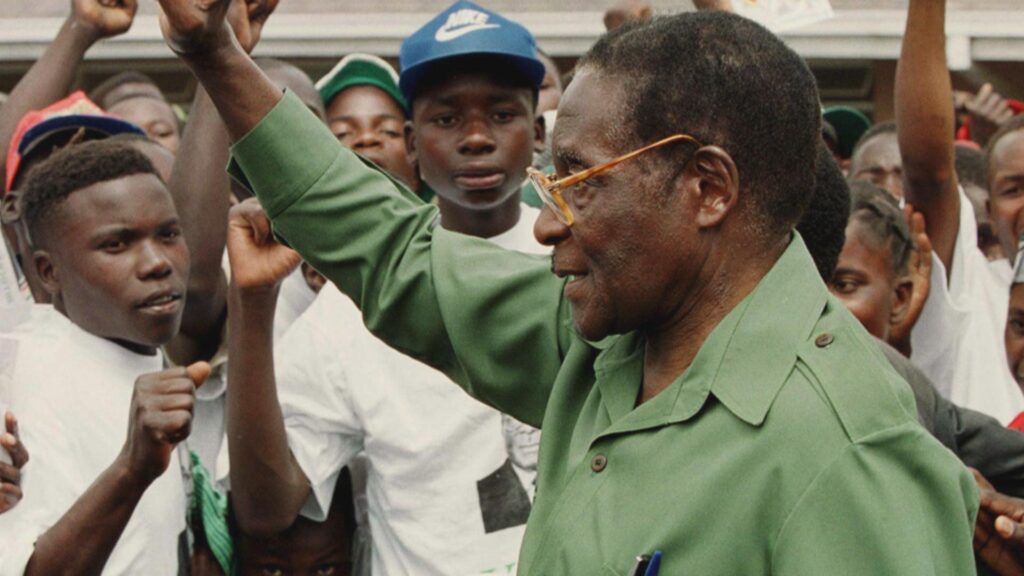
After the intervention of the international community in negotiations that were led by the neighbouring South Africa through Thabo Mbeki and then Jacob Zuma, Mugabe reluctantly agreed to share power with opposition parties. This gave rise to the Government of National Unity (GNU), whose mandate was to stabilize the country, provide healing to the nation, and prepare for and implement reforms necessary for the next elections.
That September, Mugabe and Tsvangirai agreed to a power-sharing deal. However, by 2009, about 4 million of Zimbabweans, mostly the young, professionals and skilled had left the country, with most of them getting into South Africa. Ever determined to remain in control, Mugabe still managed to retain most of the power by controlling security forces and choosing leaders for the most vital positions.
In February 2016, Mugabe made it clear that he had no plans for retirement and would remain in power until he felt he can no longer continue. This was further buttressed by his wife, Grace who appeared on national television saying that Mugabe would rule from the grave. In February 2017 after his 93rd birthday, Mugabe was given a wheelchair by some of his ministers as a birthday gift. Earlier on, his wife had indicated that Mugabe would rule from a special wheelchair.
Having been the Prime Minister of Zimbabwe from 1980 and the President from 22 December 1987 Mugabe became one of the world’s longest serving presidents as well as the world’s oldest president. So far Robert Mugabe had seven (7) Vice Presidents since the time he attained the presidency.
Robert Mugabe died on September 6, 2019, in Singapore, where he was receiving medical treatment. He was 95. He was survived by his second wife Grace; a daughter, Bona; two sons, Robert Jr. and Bellarmine Chatunga; and a stepson, Russell Goreraza.
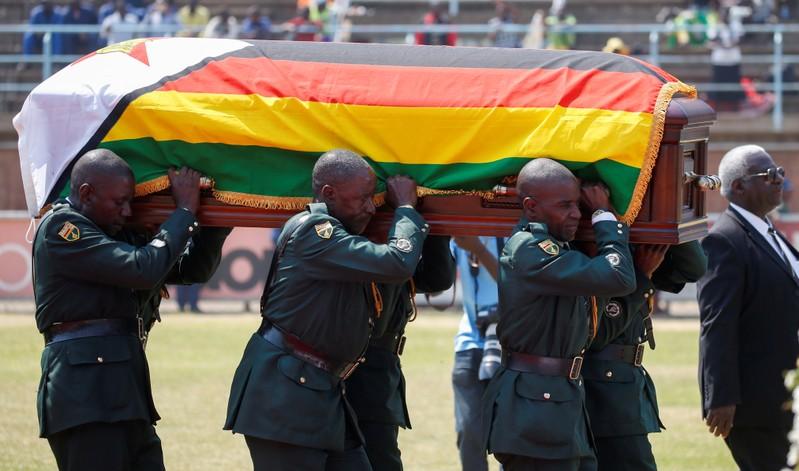
A casket carrying the remains of Robert Mugabe is brought to lie in state at the at Rufarostadium, in Mbare, Harare, Zimbabwe, September 13, 2019. REUTERS
During his 37-year rule, Mugabe attracted a great deal of controversy, mostly because of his colourful use of language.
Below are his most famous quotes:
On imperialism
“Africa must revert to what it was before the imperialists divided it. These are artificial divisions which we, in our pan-African concept, will seek to remove.” – Speech at Salisbury, 1962
“Stay with us, please remain in this country and constitute a nation based on national unity.” – A plea to the white population of Zimbabwe at a ZANU-PF rally, 1980.
“Only God, who appointed me, will remove me – not the MDC, not the British. Only God will remove me!” – Election rally, 2008. MDC is an opposition party.
“Our party must continue to strike fear in the heart of the white man, our real enemy.” – ZANU-PF rally, 2002
On homosexuality:
“We ask, was he born out of homosexuality? We need continuity in our race, and that comes from the woman, and no to homosexuality. John and John, no; Maria and Maria, no. They are worse than dogs and pigs. I keep pigs and the male pig knows the female one.” – ZDC radio interview, 2015
On Britain:
“Britain is a very cold, uninhabitable country with small houses.” – Mutare rally, 2013
“We are still exchanging blows with the British government. They are using gay gangsters. Each time I pass through London, the gangster regime of Blair ‘expresses its dismay’.” – Reference to an incident in which human rights campaigner Peter Tatchell attempted a citizens’ arrest on Mugabe during a visit to London in October, 1999
“We have fought for our land, we have fought for our sovereignty, small as we are we have won our independence and we are prepared to shed our blood … So, Blair keep your England, and let me keep my Zimbabwe.” – Earth Summit, South Africa, 2002
On Hitler:
“I am still the Hitler of the time. This Hitler has only one objective: justice for his people, sovereignty for his people, recognition of the independence of his people and their rights over their resources. If that is Hitler, then let me be Hitler tenfold. Ten times, that is what we stand for.” – State funeral of a cabinet minister, 2003
On the economy:
“Our economy is a hundred times better than the average African economy. Outside South Africa, what country is [as good as] Zimbabwe? … What is lacking now are goods on the shelves – that is all.” – Interview, 2007
On Jesus:
“I have died many times – that’s where I have beaten Christ. Christ died once and resurrected once.” – To state radio on his 88th birthday
On cricket:
“Cricket civilises people and creates good gentlemen. I want everyone to play cricket in Zimbabwe; I want ours to be a nation of gentlemen.” – This is a widely reported quote, but it is unclear when Mugabe said this.
On US presidents:
“Let Mr Bush read history correctly. Let him realise that both personally and in his representative capacity as the current president of the United States, he stands for this ‘civilisation’, which occupied, which colonised, which incarcerated, which killed. He has much to atone for and very little to lecture us on the Universal Declaration of Human Rights. His hands drip with [the] innocent blood of many nationalities.” – UN General Assembly, 2007
“I’ve just concluded – since President Obama endorses same-sex marriage, advocates homosexual people, and enjoys an attractive countenance – thus if it becomes necessary, I shall travel to Washington, DC, get down on my knee, and ask his hand.” – ZDC radio interview, 2015
“Some of us were embarrassed, if not frightened, by what appeared to be the return of the biblical giant gold Goliath. Are we having a return of Goliath to our midst, who threatens the extinction of other countries?” – UN General Assembly, 2017
“May I say to the United States President, Mr Trump, please blow your trumpet. Blow your trumpet in a musical way towards the values of unity, peace, cooperation, togetherness, dialogue, which we have always stood for.” – UN General Assembly, 2017
On grooming a successor:
“Grooming a successor, is it an inheritance? In a democratic party, you don’t want leaders appointed that way. They have to be appointed properly by the people.” – TV interview, 2016


